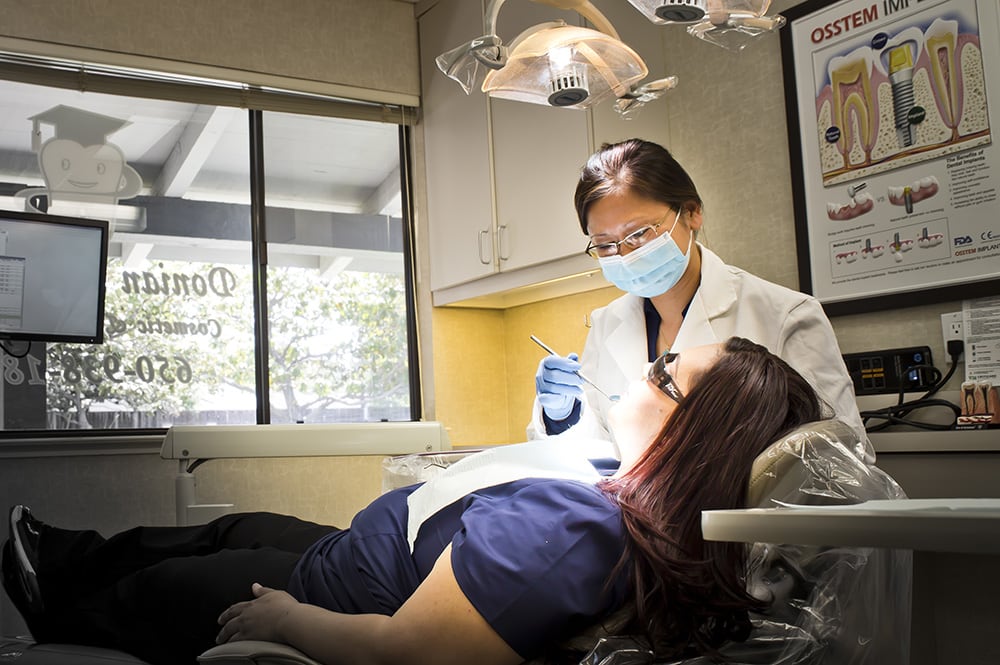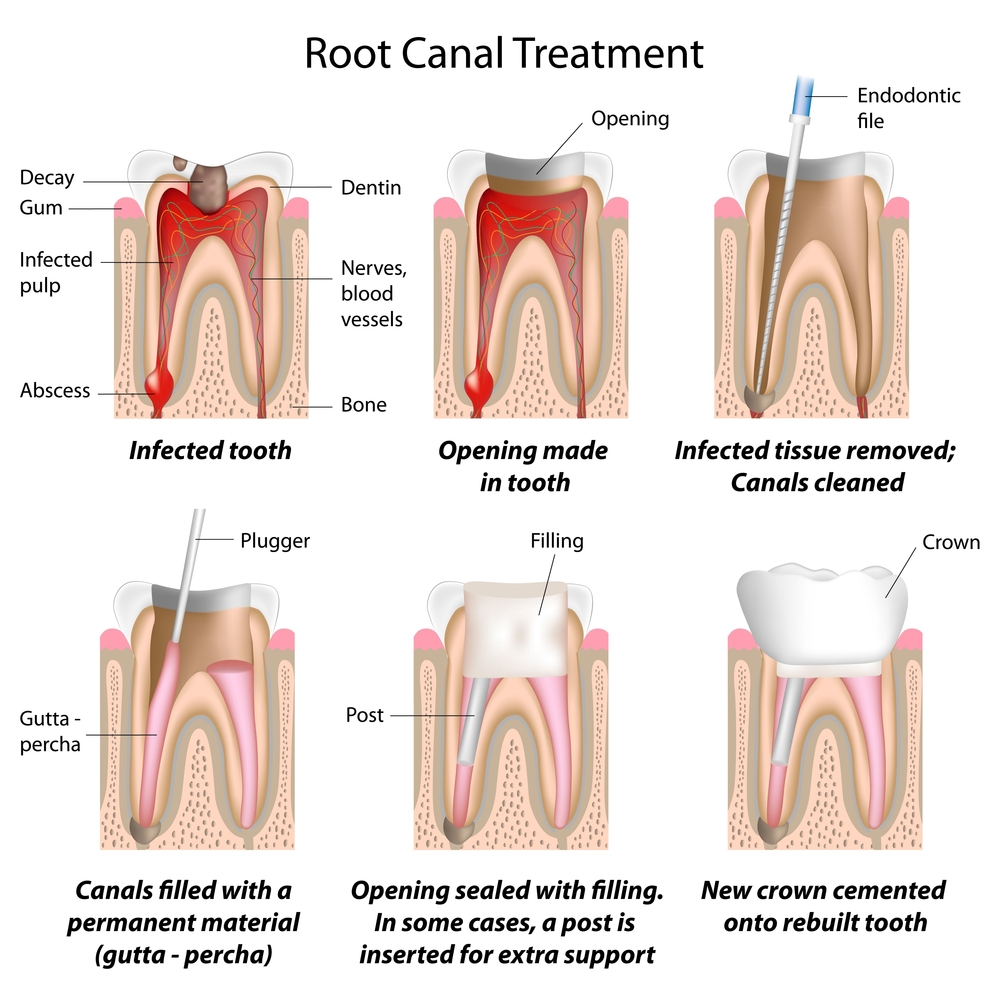Sometimes decay, a crack, or another dental issue can cause a tooth’s root canal to become infected. This can lead to a great deal of pain and may also endanger the entire tooth. Besides discomfort, you may experience significant swelling, tooth darkening, gum soreness, drainage problems, or even bone loss. In many cases, it is possible to save a majority of the tooth by cleaning out the infection and covering the remaining structure with a dental crown. Dr. Donian Shen, our skilled dentist, uses the latest advances in root canal therapy to make this procedure easier and more comfortable than ever.
What Happens During the Root Canal Procedure?
In the beginning stages of the root canal procedure, an anesthetic will typically be used to numb the affected tooth and the surrounding area. An opening through the tooth’s crown and into the pulp (the soft center of the tooth that houses the nerves, blood vessels, and connective tissue) will then be created. Once the diseased pulp is removed, we clean and enlarge the root canal area. The root canal and chamber may then be permanently filled and sealed. A temporary filling is placed in the tooth’s opening before your next visit. Depending on your individual case, the tooth could be left open in order to let the infection drain.
The inside of the tooth will be sterilized at your next visit to remove any bacteria. The root canal and pulp chamber are permanently filled to complete the process. Your tooth is finally restored to chewing function, which may involve placing a permanent filling or dental crown. If discoloration is an issue, we can provide teeth whitening following the procedure.


How Much Does a Root Canal Cost?
The cost of a root canal will vary depending on the level of damage sustained and the techniques used to restore the tooth. Dr. Shen will discuss your options during your initial consultation and develop a customized treatment plan based on your needs and goals. Dental insurance often covers a portion of root canal treatment, and our skilled team can help you determine what type of coverage, if any, your policy provides.
What Happens After a Root Canal?
After your root canal treatment, you should be able to return home. Dr. Shen will provide you with any instructions for how to care for your temporary dental crown, as well as any directions for medication. In approximately three weeks, you should be able to return for a follow-up appointment where your permanent crown will be placed and the fit and outcome evaluated. Complications following a root canal are rare, and we will make every effort to ensure your experience is a pleasant and successful one.
“Great place definitely recommend, had wisdom teeth extracted and root canal, very well organised and explained well , great staff .great experience with extraction procedure. Everything went well . Great place , definitely recommend.”
Additional Frequently Asked Questions (FAQs) About Root Canal Therapy
To aid you in your research, Dr. Shen has answered a number of commonly asked questions about root canal treatment. If you have additional inquiries, or if you would like to schedule a consultation, don’t hesitate to reach out to our team.
Do Root Canals Hurt?
Patients are often concerned about what the root canal experience is like and whether they will feel any pain. While this procedure can be a little uncomfortable for some, Dr. Shen utilizes the most advanced techniques available to minimize discomfort. You will be given a local anesthetic to reduce pain, and sedation dentistry options can provide additional relief if you experience dental phobia. We want you to feel at ease, so please let us know how we can help improve your time with us.
Do Root Canals Require Multiple Trips to the Dentist?
The latest advances in dental technology make it possible to complete a root canal in one to two visits. At the initial appointment, your root canal procedure will be performed and a mold will be taken. A temporary dental crown will be placed, and a permanent crown will be fashioned during a short interim. At the second visit, the newly created crown will be placed and Dr. Shen will evaluate the fit for optimal results.
Can Antibiotics Cure a Root Canal?
Antibiotics can be a useful tool to alleviate certain symptoms; however, only a root canal can effectively address the infection located deep within the tooth. Since there is no blood supply that travels to the tooth root, antibiotics cannot be delivered there. As a result, Dr. Shen must remove the infection directly, via a root canal.
If My Tooth Doesn’t Hurt, Why Do I Need a Root Canal?
A tooth can develop an infection without you experiencing any pain. Our skilled dentist can test for infection and determine if the pulp inside the tooth is damaged or infected. If so, a root canal may be necessary to save the tooth. Remember, a root canal is a tooth-sparing treatment that preserves as much of the original tooth structure as possible.
Is Pulling the Tooth Better Than a Root Canal?
Generally speaking, pulling the tooth should be a last resort. A root canal preserves the healthy tooth structure, as well as the density of the underlying jawbone, which can help to protect your ability to chew, eat, and speak. Additionally, replacing an extracted tooth often is more expensive than root canal treatment. Millions of Americans have undergone endodontic treatment safely and successfully. In many cases, the restored tooth can continue to aid oral function for years, even decades. If the tooth cannot be saved, Dr. Shen may recommend the tooth be pulled and replaced with a dental implant. If, however, the tooth can be saved, root canal treatment can be an excellent method with lasting, aesthetically appealing results.
If you have additional questions about root canal treatment and what to expect, contact us today. Our friendly and knowledgeable team is happy to answer questions and to help you schedule a free consultation with Dr. Shen.*

